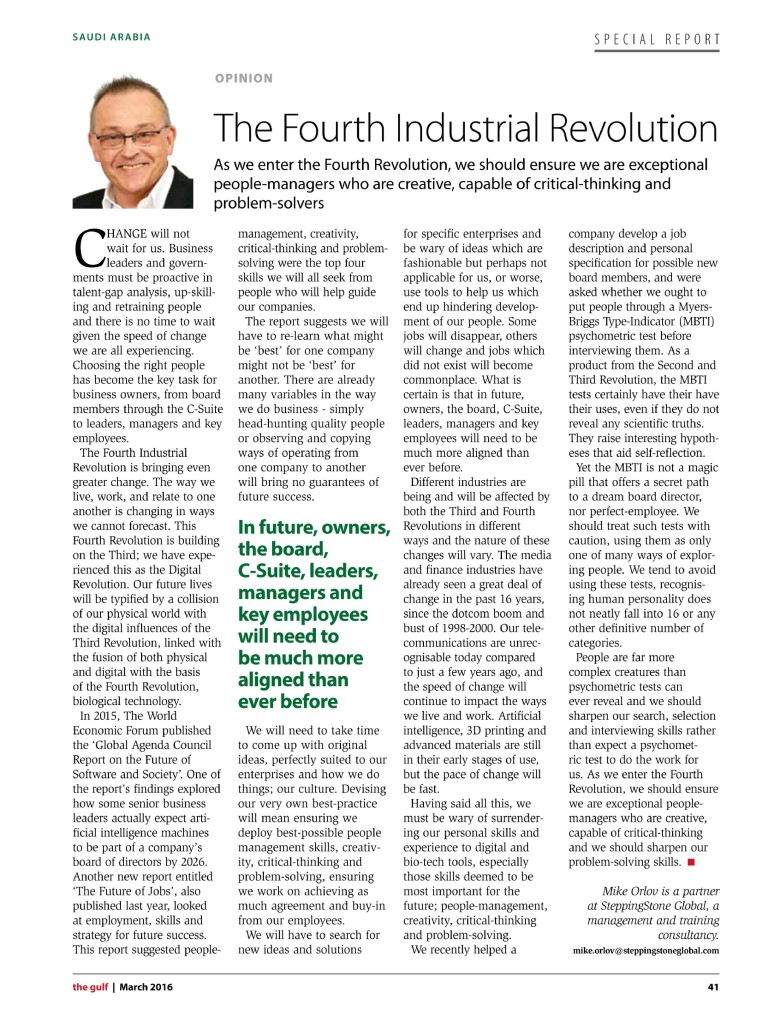 Sharpening our Skills for the Fourth Industrial Revolution
Sharpening our Skills for the Fourth Industrial Revolution
Change will not wait for us. Business leaders and governments need to be proactive in talent-gap analysis, up-skilling and retraining people and there is no time to wait given the speed of change we are all experiencing. Choosing the right people has become the key task for business owners, from members of the board through the C-Suite to leaders, managers and key employees.
The Fourth Industrial Revolution is bringing even greater change. The way we live, work, and relate to one another is changing in ways we cannot forecast. This Fourth Revolution is building on the Third; we have experienced this as the Digital Revolution. Our lives in the future will be typified by a collision of our physical world with the digital influences of the Third Revolution, linked with the fusion of both physical and digital with the basis of the Fourth Revolution, biological technology.
In 2015, The World Economic Forum published the ‘Global Agenda Council Report on the Future of Software and Society’. One of the report’s findings explored how some senior business leaders actually expect artificial intelligence machines to be part of a company’s board of directors by 2026. Another new report entitled ‘The Future of Jobs’, also published last year, looked at employment, skills and strategy for future success. This report suggested people-management, creativity, critical-thinking and problem-solving were the top four skills we will all be seeking from people who will help guide our companies.
The report suggests we will have to re-learn what might be ‘best’ for one company might not be ‘best’ for another. There are already many variables in the way we do business, simply head-hunting quality people or observing and copying ways of operating from another company to another will not bring any guarantees of future success.
We will need to take time to come up with original ideas, perfectly suited to our enterprises and how we do things; our culture. Devising our very own best-practice will mean ensuring we deploy best-possible people-management skills, creativity, critical-thinking and problem-solving, ensuring we work on achieving as much agreement and buy-in from our employees.
We will have to search for new ideas and solutions for specific enterprises and be wary of ideas which are fashionable but perhaps not applicable for us, or worse, use tools to help us which end up hindering development of our people. Some jobs will disappear, others will change and jobs which did not exist will become commonplace. What is certain is that in the future, owners, the board, C-Suite, leaders, managers and key employees will need to be much more aligned than ever before.
Different industries are being and will be affected by both the Third and Fourth Revolutions in different ways and the nature of these changes will vary. The media and finance industries have already seen a great deal of change in the past 16 years, since the dotcom boom and bust of 1998 – 2000. Our telecommunications are unrecognizable today compared to just a few years ago, and the speed of change will continue to impact the ways we live and work. Artificial intelligence, 3D printing and advanced materials are still in their early stages of use, but the pace of change will be fast.
Having said all this, we must however be wary of surrendering our personal skills and experience to digital and bio-tech tools, especially those skills deemed to be most important for the future; people-management, creativity, critical-thinking and problem-solving.
We were recently helping a company with developing a job description and a personal specification for possible new board members, and were asked whether we ought to put people through a Myers-Briggs Type-Indicator (MBTI) psychometric test before interviewing them. As a product from the Second and Third Revolution, the MBTI tests certainly have their have their uses, even if they do not reveal any scientific truths. They raise interesting hypotheses that aid self-reflection and I am proud to be an ENTJ, which I have been since I first took the test some decades ago.
Yet the MBTI is not a magic pill that offers a secret path to a dream board-director, nor perfect-employee. We should treat such tests with caution, using them as only one of many ways of exploring people. We tend to avoid using these tests, recognizing human personality does not neatly fall into 16 or any other definitive number of categories. People are far more complex creatures than psychometric tests can ever reveal and we should sharpen our search, selection and interviewing skills rather than expect a psychometric test to do the work for us. As we enter the Fourth Revolution, we should ensure we are exceptional people-managers who are creative, capable of critical-thinking and we should sharpen our problem-solving skills.
